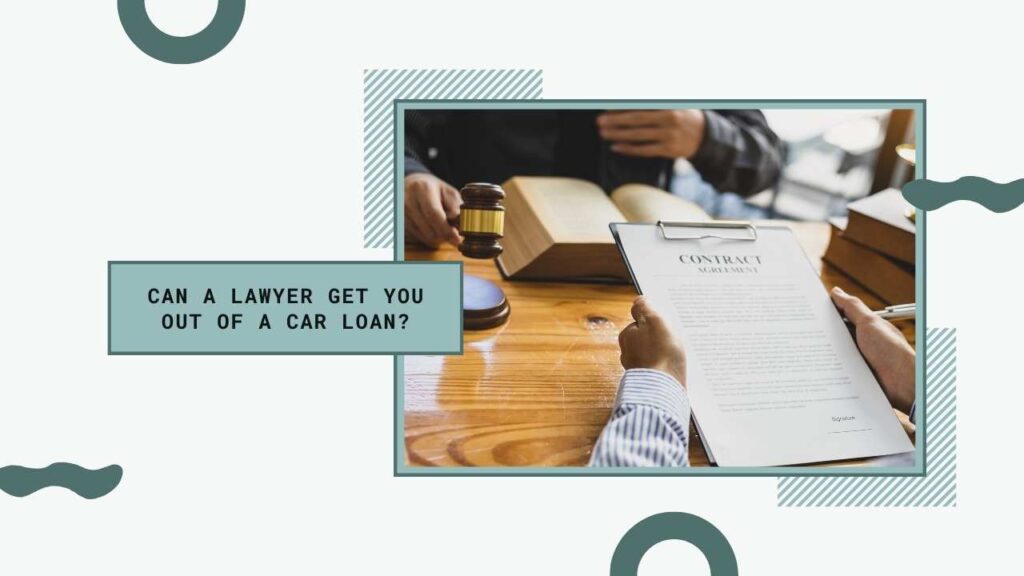A lawyer may help negotiate terms or find legal grounds to dispute or modify a car loan, potentially leading to more favorable conditions or even termination of the loan. However, success depends on the specific circumstances and terms of the loan agreement.
Introduction
Navigating the complexities of a car loan agreement can be daunting, especially when seeking a way out. In this context, enlisting a lawyer’s expertise becomes a consideration for many. A lawyer can scrutinize the loan terms, identifying any legal loopholes or unfair practices that could be leveraged to renegotiate the agreement or, in some cases, facilitate an exit from the loan. Their legal acumen offers hope for those feeling trapped by their financial commitments.
Legal Grounds for Terminating a Car Loan
Finding a pathway out of a car loan may seem daunting, but specific legal grounds can offer a route to termination. A lawyer can play a crucial role in identifying and arguing these grounds on behalf of borrowers.
Fraud or Misrepresentation
If a car loan was obtained under fraudulent circumstances or through misrepresentation by the lender or dealership, this could provide a legal basis for termination. Examples include misleading information about the loan’s terms, interest rates, or the vehicle’s condition. A lawyer can help gather evidence and present a case to challenge the loan’s validity.
Contract Breaches by the Lender
Borrowers may have legal recourse if the lender fails to adhere to the agreed-upon terms of the loan contract. This could include unauthorized changes to interest rates or failure to provide legally required disclosures. A breach of contract can serve as a foundation for renegotiating the loan terms or potentially terminating the agreement altogether.
Unconscionable Contracts
A contract may be considered excessive if the terms are unfair or oppressive to one party. In the context of a car loan, this might involve exorbitant interest rates or clauses that heavily penalize the borrower for circumstances beyond their control. A lawyer can argue that the contract is invalid for unconscionability, leading to possible renegotiation or cancellation.
Exploring these legal grounds requires a thorough understanding of contract law and a strategic approach to litigation. Lawyers specializing in consumer rights and financial contracts can assess the specifics of a car loan agreement to determine the best course of action for those seeking relief from burdensome financial obligations.
Negotiation and Settlement
Negotiation and settlement stand out as viable strategies in the quest to alleviate the burden of a car loan. Leveraging legal expertise, borrowers can engage with lenders more equally, exploring avenues for more manageable financial solutions.
Lawyer’s Role in Negotiating with Lenders
A lawyer acts as a crucial intermediary in negotiations, bringing legal knowledge and negotiation skills. They can communicate effectively with lenders to renegotiate loan terms, such as reducing the interest rate, extending the loan period, or even reducing the principal amount owed. Their involvement adds seriousness and professionalism to the discussions, potentially leading to more favorable outcomes for the borrower.
Debt Settlement Agreements
In some cases, a lawyer can negotiate a debt settlement agreement, where the lender agrees to accept a lump sum payment that is less than the total amount owed to release the borrower from their remaining obligations. This route requires careful legal and financial consideration, which may affect the borrower’s credit score and economic stability. A lawyer can help navigate these complexities, ensuring that the settlement is in the borrower’s best interest and that all legal requirements are met.
Navigating the intricacies of negotiation and settlement requires a blend of legal expertise, negotiation prowess, and financial acumen. By enlisting the help of a lawyer, borrowers can explore these avenues more thoroughly, potentially finding a way to lessen or eliminate the financial strain of a car loan.
Consumer Protection Laws
Consumer protection laws serve as a critical shield for borrowers against unfair and predatory lending practices, offering pathways to contest and potentially exit burdensome car loans.
Federal and State Consumer Protection Acts
Both federal and state governments have enacted various consumer protection acts designed to safeguard borrowers from deceptive, unfair, or fraudulent practices in the lending process. These laws cover multiple issues, from disclosing loan terms to legalizing specific contract provisions. A lawyer can help borrowers understand the specific protections these acts offer, such as the Truth in Lending Act (TILA) and the Fair Debt Collection Practices Act (FDCPA), and how they apply to their car loan situation.
Legal Recourse under Consumer Protection Laws
Through the lens of consumer protection laws, borrowers have several legal resources to challenge or renegotiate their car loans. If a lender has violated any aspect of these laws, a borrower, with the assistance of a lawyer, can sue for damages or use the violation as leverage to negotiate more favorable loan terms. Sometimes, these laws may even provide a basis for terminating the loan contract. Lawyers specializing in consumer protection can assess the loan agreement and the lender’s practices to identify violations and advise on the best action.
Navigating consumer protection laws requires a deep understanding of both the legal landscape and the specifics of the borrower’s loan agreement. With legal expertise, borrowers can harness these laws to defend their rights and seek relief from oppressive car loans.
Bankruptcy as a Last Resort
Turning to bankruptcy represents a critical juncture for individuals overwhelmed by financial obligations, including onerous car loans. It’s a complex process that can offer a fresh start, albeit with significant considerations.
Explanation of Bankruptcy Process
Bankruptcy involves legally declaring oneself unable to repay outstanding debts, including car loans. There are different chapters of bankruptcy, each with its processes and outcomes. For example, Chapter 7 may lead to the liquidation of assets to pay off debts, potentially including the surrender of the vehicle associated with the car loan. Chapter 13, on the other hand, involves restructuring debts into a more manageable repayment plan, possibly allowing the debtor to keep their vehicle under revised terms. The process is intricate, with strict eligibility criteria and long-term financial implications, particularly regarding creditworthiness.
Role of a Lawyer in Bankruptcy Filings
A lawyer’s expertise is indispensable in navigating the bankruptcy process. They can provide critical advice on which chapter of bankruptcy to file under, prepare and file the necessary paperwork, represent the debtor in court proceedings, and negotiate with creditors, including car loan lenders. A lawyer can also offer invaluable guidance on bankruptcy’s potential consequences, helping debtors make informed decisions about whether this path aligns with their long-term financial goals.
Bankruptcy is a last resort due to its profound impact. However, with the support of a knowledgeable lawyer, it can provide a legal avenue for individuals seeking relief from unsustainable car loans and other debts, allowing for a chance to rebuild financial stability.
Limitations and Considerations
Seeking to terminate a car loan with legal assistance involves navigating a complex landscape of financial and practical considerations. Understanding these limitations is crucial for setting realistic expectations and making informed decisions.
Financial Implications of Terminating a Car Loan
Terminating a car loan, primarily through legal means, can have significant financial implications. Potential costs include:
- Legal fees.
- Potential penalties for early loan termination.
- The impact on one’s credit score.
These financial consequences can extend beyond the immediate relief of loan termination, affecting future borrowing costs and opportunities. Borrowers must weigh the immediate benefits of terminating a loan against the long-term financial health and credit implications.
Practicality and Likelihood of Success
The practicality and likelihood of successfully terminating a car loan through legal avenues vary widely depending on individual circumstances, the specifics of the loan agreement, and the lender’s practices. Not all attempts to terminate a car loan will be successful, and the process can be time-consuming and challenging. The effectiveness of legal intervention will depend on factors such as contractual breaches or legal violations by the lender. Borrowers must realistically assess their situation with their lawyer to determine the feasibility of pursuing loan termination and the potential for achieving a favorable outcome.
The complexities of terminating a car loan require careful consideration of the financial implications and the practicality of legal action. Borrowers should engage with legal counsel to thoroughly understand their position, explore all options, and strategically plan their next steps, keeping immediate and future financial health in mind.
FAQs
Can a lawyer help me get out of a car loan?
Yes, a lawyer can assist in navigating legal avenues to get out of a car loan, such as negotiating with lenders, identifying contractual breaches, or leveraging consumer protection laws.
What legal grounds can be used to terminate a car loan?
Legal grounds might include fraud or misrepresentation by the lender, breach of contract, or the existence of an unconscionable contract that unfairly disadvantages the borrower.
Are there any financial downsides to using a lawyer to get out of a car loan?
While a lawyer can offer paths to potentially exit a car loan, there are financial considerations, including legal fees and the potential impact on your credit score, that should be weighed carefully.
Is bankruptcy a viable option to get out of a car loan?
Bankruptcy can be a last resort for getting out of a car loan. It can discharge or restructure debts under specific chapters but has significant long-term financial implications.
How likely can a lawyer successfully get me out of a car loan?
The likelihood of success varies based on individual circumstances, the specifics of the loan agreement, and the lender’s practices. A lawyer can provide a realistic assessment based on your situation.
Conclusion
A car loan agreement’s complexities require not just legal expertise but a strategic approach that an experienced lawyer can offer. By assessing the terms of your contract, a lawyer can identify any discrepancies or avenues for renegotiation or termination. While not a guaranteed escape route, legal intervention can significantly increase your chances of finding a viable solution to an unfavorable car loan. Hiring a lawyer can be a crucial step towards regaining financial freedom and making informed decisions about your automotive investments.













